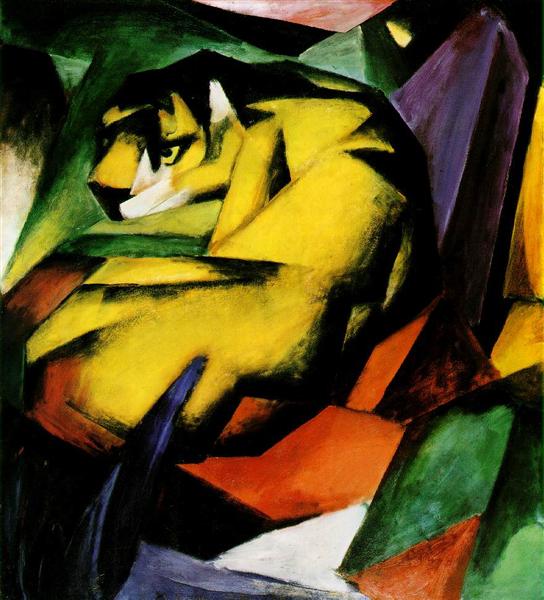Description
Franz Marc's "Tigre" work, created in 1912, is at the crossroads of the subjective exploration of color and an emotional representation of nature, key elements in the development of German expressionism. In this painting, Marc captures the fierce essence and at the same time sublime of the tiger, a symbol of primal force and wild beauty. The work stands out for its bold color use and dynamic composition, characteristics that underline the sensitivity of the artist towards the emotional and spiritual states of living beings.
When observing "tiger", the viewer is immediately attracted to the vibrant use of color. Marc uses a predominantly orange and yellow palette, which evokes the heat and intensity of animal life in its natural habitat. These colors are complemented with darker blue and green tones that frame to the tiger, creating a contrast that not only highlights the figure of the animal, but also suggests the interaction between the beast and its surroundings. This expressive use of color is part of what distinguishes Marc, who saw colors not only as visual elements, but as carriers of deep emotional meaning.
The composition of the painting is dynamic and suggests movement. The tiger, in a pose that transmits both vigor and a kind of rest, is arranged so that his body is curved in line with the contour of its surroundings, creating a visual connection between the animal and the elements that surround it. Attention to detail in the patterns of his fur is remarkable, and the way Marc stylizes the form of the tiger highlights his interest in simplism and abstraction that can be extracted from naturalism. The eyes, large and expressive, capture a look that transmits both concentration and ferocity, characteristics of the majestic feline.
Franz Marc was an outstanding member of the Der Blaue Reiter movement, who was looking for an art form that expressed the spiritual and emotional, beyond the mere reproduction of the visible world. "Tigre" is a clear example of this search. The work is not just about representing an animal, but, through its vibrant and lyric style, it seeks to communicate the connection between animal life and a transcendental reality, a feeling that permeates much of its work.
Marc's interest in animals also reflects a broader concern about nature and a desire to escape the growing industrialism of his time. At a time when modernity began to transform the European landscape, its approach to animals can be interpreted as a return to a more purified form of existence, where instinct and the essence of natural life would predominate over human progress.
When analyzing "Tigre", one cannot avoid reflecting on the understanding of the work in the context of art history. Like other contemporary works of his time, Marc's painting resonates with the spirit of expressionism that sought to break the established norms and transmit personal experiences in a visceral and captivating way. It is a powerful reminder of how, through art, not only forms and colors can be captured, but also the emotions and instincts that connect us all with the world around us.
In summary, "Tigre" is emblematic of the unique style of Franz Marc and his commitment to an art that sought to give voice to the spiritual in the animal. Its colorful vibrant, its dynamic composition and its intrinsic symbolism make this work not only a representation of the beauty of the tiger, but also a meditation on the relationship between humans and the animal kingdom, an issue that resonates especially today. The work invites spectators to a contemplative experience, which goes beyond the physical environment, towards a deeper emotional connection with nature itself.
KUADROS ©, a famous paint on your wall.
Hand-made oil painting reproductions, with the quality of professional artists and the distinctive seal of KUADROS ©.
Art reproduction service with satisfaction guarantee. If you are not completely satisfied with the replica of your painting, we refund your money 100%.

